| Srl | Item |
| 1 |
ID:
114582
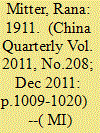

|
|
|
|
|
| Publication |
2011.
|
| Summary/Abstract |
One hundred years after the 1911 Revolution (Xinhai Revolution) in China, its meaning continues to be highly contested. Paradoxically, the more time that passes, the less certain either political actors or scholars seem to be about the significance of 1911 for the path of Chinese revolutionary history. This essay examines three phenomena: the appropriation of 1911 in contemporary political and popular culture; the use of 1911 as a metaphor for contemporary politics by PRC historians; and the changing meaning of 1911 over the past ten decades, particularly during the years of the war against Japan. The essay concludes that it is precisely the "unanchored" nature of 1911, separated from any one path of historical interpretation, that has kept its meaning simultaneously uncertain and potent.
|
|
|
|
|
|
|
|
|
|
|
|
|
|
|
|
| 2 |
ID:
152958
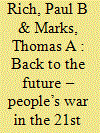

|
|
|
|
|
| Summary/Abstract |
This issue of Small Wars and Insurgencies focuses on the continuing importance of Maoist and post-Maoist concepts of people’s war. It has assembled a collection of papers that addresses various examples from around the world, with an emphasis on South America, where the premier illustration, that of Colombia’s FARC, was Marxist-Leninist but not Maoist, yet embraced the form and strategy of people’s war in a bid which at one point had the state in a critical situation. The collection comes in the wake of previous papers published in this journal on politically Maoist insurgent movements in South Asia, notably Mika Kerttuenen’s study of Maoist insurgents in Nepal and Prem Mahadevan’s survey of Maoist insurgencies in India and their links to organized crime (Kerttunen, “A Transformed Insurgency,” 78–118; Mahadevan, “The Maoist Insurgency in India,” 203–20). The papers confirm that people’s war remains an important analytical framework in the study of small wars and insurgencies, for some even a ‘model’ through which to understand distinct types of insurgent movements and their strategies.
|
|
|
|
|
|
|
|
|
|
|
|
|
|
|
|
| 3 |
ID:
115847
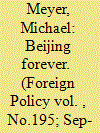

|
|
|
| 4 |
ID:
174922
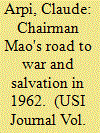

|
|
|
| 5 |
ID:
065089
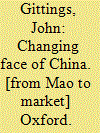

|
|
|
|
|
| Publication |
Oxford, Oxford University Press, 2005.
|
| Description |
x, 372p.: ill.hbk
|
| Standard Number |
0192806122
|
|
|
|
|
|
|
|
|
|
|
|
Copies: C:1/I:0,R:0,Q:0
Circulation
| Accession# | Call# | Current Location | Status | Policy | Location |
| 050009 | 951.05/GIT 050009 | Main | On Shelf | General | |
|
|
|
|
| 6 |
ID:
123233
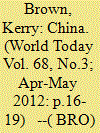

|
|
|
| 7 |
ID:
130716
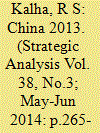

|
|
|
|
|
| Publication |
2014.
|
| Summary/Abstract |
It is a matter of widespread belief that on assumption of supreme power, Chinese leader Xi Jinping's overall ambition was to emerge as an iconic figure in the same league as Mao Zedong and Deng Xiaoping. At the very outset, Xi realised this would necessitate the elimination of any political challenge and his first step was therefore to consolidate an unassailable position within the Standing Committee of the Party Politburo (PBSC). To achieve this objective, Xi chose to emulate some of the policies and methods of the late Mao Zedong, albeit with modern underpinnings.
|
|
|
|
|
|
|
|
|
|
|
|
|
|
|
|
| 8 |
ID:
157414
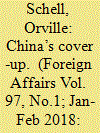

|
|
|
|
|
| Summary/Abstract |
The Chinese Communist leader Mao Zedong’s “permanent revolution” destroyed tens of millions of lives. From the communist victory in 1949 in the Chinese Civil War, through the upheaval, famine, and bloodletting of the Great Leap Forward and the Cultural Revolution, until Mao’s death in 1976, the Chinese Communist Party (CCP) set segments of Chinese society against one another in successive spasms of violent class warfare. As wave after wave of savagery swept China, millions were killed and millions more sent off to “reform through labor” and ruination.
|
|
|
|
|
|
|
|
|
|
|
|
|
|
|
|
| 9 |
ID:
114840
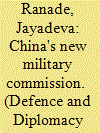

|
|
|
| 10 |
ID:
126406
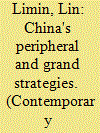

|
|
|
| 11 |
ID:
115615
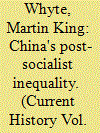

|
|
|
|
|
| Publication |
2012.
|
| Summary/Abstract |
The country's sharp increase in income inequality is not the result of the rich getting richer while the poor become poorer.
|
|
|
|
|
|
|
|
|
|
|
|
|
|
|
|
| 12 |
ID:
187364
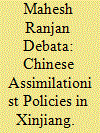

|
|
|
|
|
| Summary/Abstract |
This research article argues that the China’s intention and contention to maintain stronghold in Xinjiang through different policies from time to time reflects the views of Realist theory of international relations, which gives primacy to ‘national interest’ and ‘national security.’ Furthermore, the article argues that the Chinese emphasis on national security and stability in Xinjiang negates the ‘interests and aspirations’ of minority groups in Xinjiang (especially Uyghurs), which form the basis of constructive approach of international relations. While elaborating Chinese policies of assimilation of Uyghurs in Xinjiang from Mao Zedong to Xi Jinping, this article tries to examine how China’s bid to pursuing a kind of hardcore realism in preserving and protecting its interests in Xinjiang (stringent policies) has been contradicting and disregarding the essence of constructivist perspective (aims, and aspirations interests of Uyghurs).
|
|
|
|
|
|
|
|
|
|
|
|
|
|
|
|
| 13 |
ID:
003819
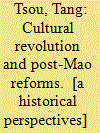

|
|
|
|
|
| Publication |
Chicago, University of Chicago Press, 1986.
|
| Description |
xlv, 351p.hbk
|
| Standard Number |
0226815137
|
|
|
|
|
|
|
|
|
|
|
|
Copies: C:1/I:0,R:0,Q:0
Circulation
| Accession# | Call# | Current Location | Status | Policy | Location |
| 027685 | 951.056/TSO 027685 | Main | On Shelf | General | |
|
|
|
|
| 14 |
ID:
118452
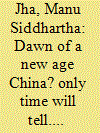

|
|
|
| 15 |
ID:
186939
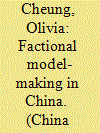

|
|
|
|
|
| Summary/Abstract |
This article introduces the analytical framework of “factional model-making” to describe and explain the open political contention of Chinese Communist Party elites in the policy process. Party elites undertake factional model-making to express policy disagreements and to signal their power to the regime: by flouting the Party line publicly without punishment, they show that they can influence the Party line and therefore pressurize the regime into acknowledging their position in the opaque power structure. This article chronicles the history of factional model-making from the 1960s to 2012 and examines in detail the making of Henan's Nanjie Village into a re-collectivization model by the Party's left. The process began in the 1990s and ended soon after Xi Jinping came to power in 2012, which prompted Nanjie's patrons to recast the village as a Party model trumpeting Xi's line. The suppression of factional model-making under Xi is discussed in the conclusion.
|
|
|
|
|
|
|
|
|
|
|
|
|
|
|
|
| 16 |
ID:
176402
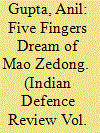

|
|
|
| 17 |
ID:
128522
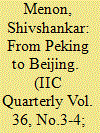

|
|
|
| 18 |
ID:
123102
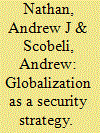

|
|
|
|
|
| Publication |
2013.
|
| Summary/Abstract |
Andrew J. Nathan AND Andrew Scobell analyze the gains and losses to Chinese security from the country's embrace of globalization in the post-Mao period. They argue that while China has grown richer and more influential, it has also been penetrated by global forces that it does not control and enmeshed in complex relationships of interdependence.
|
|
|
|
|
|
|
|
|
|
|
|
|
|
|
|
| 19 |
ID:
067258
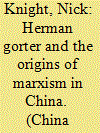

|
|
|
| 20 |
ID:
122225
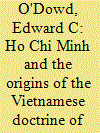

|
|
|
|
|
| Publication |
2013.
|
| Summary/Abstract |
In a very important sense, the Vietnamese military history of the communist era began in 1941, when Ho Chi Minh prepared 'Guerrilla Tactics' (Cach Danh Du Kich).1
The publication of this essay, which was a manual on the tactics, techniques, and procedures of guerrilla warfare, preceded the founding of the first armed propaganda unit (Tuyen Truyen Doi Vo Trang) on 22 December 1944, which later became the People's Army of Vietnam (PAVN, Quan Doi Nhan Dan); as well as the revolutionary writings of Truong Chinh (1946-1947) and Vo Nguyen Giap (1959). The fact that 'Tactics' was published by the Viet Minh reinforces the claim made by the PAVN that it was the first authoritative Vietnamese writing on this important subject.
|
|
|
|
|
|
|
|
|
|
|
|
|
|
|
|